Last night's glittering 37th Golden Horse Awards was filled with its usual share of upsets and surprises. Ang Lee's Crouching Tiger, Hidden Dragon picked up the important best film award, leaving sentimental favorite In the Mood for Love left to ponder what might have been.
But it was the announcements that low-budget shoot'em up -- The Mission -- had won best director and best leading actor that surprised most, pipping the favorites Crouching Tiger and In the Mood.
One winner that came as no surprise was Maggie Cheung's gong for Best Leading Actress -- her fourth.

PHOTO: TAI LI-AN, TAIPEI TIMES
Ever the gracious winner, she said it was a pity that Michelle Yoeh had failed to take the award, commenting that people had failed to notice her fine acting.
Crouching Tiger won a total of six awards, though most of them in minor technical sections.
Ang Lee, though disappointed he would missed out on best director was comforted by news that Crouching Tiger will represent Taiwan in the best foreign picture category in the upcoming Oscars.
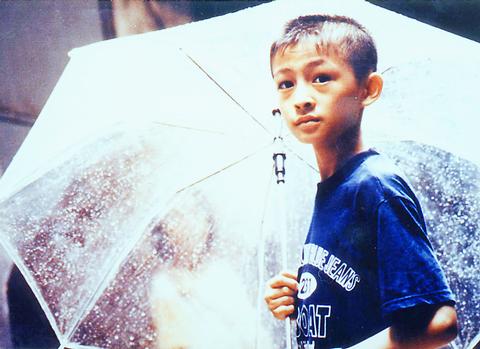
PHOTO: COURTESY OF NEW ACTION ENTERTAINMENT CO., LTD.
Speaking about his picture when presenting the awards for Best Leading Actor, Lee said that his film was the fulfillment of a boyhood dream.
"Everyone has a dragon inside them," he said. "Everyone must pursue it."
This was perhaps exactly want brought To Kei-fung his best director award. The Mission was a very low budget feature, even by Hong Kong standards, but he said that without the financial pressures he "didn't have to compromise" in making the film he wanted -- in this case, a highly visual action drama with minimal dialogue. Francis Ng, a virtual unknown in cinema, knocked out the much touted Tony Leung for Best Actor.
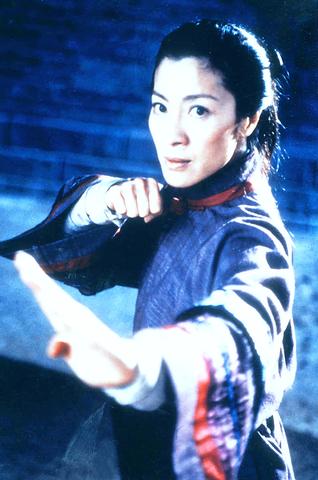
PHOTO: COURTESY OF BUENA VISTA FILM CO., LTD.
In fact, Wang Ka-wei's In The Mood For Love won only three awards from nine nominations.
The Cabbie -- the only fully film produced in Taiwan -- was pushed out by the greater attention given to Lament of Sand River, which picked up both the Best Supporting Actress Award and Best Art Direction, to make a particularly fine showing for a virtual unknown.
Chang Chih-yung, the director of Lament was also awarded the Jury Special Prize, a category restricted to locally produced films. After accepting the award, he said he was not particularly pleased, as the award was not part of the open competition.
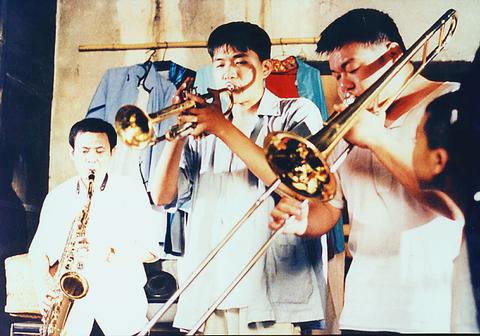
PHOTO: COURTESY OF CENTRAL MOTION PICTURE CORPORATION
"It is no more than a consolation prize," he said.
He thought that it would be preferable to have a new category such as "best new director" open to all films.
Another critical note was sounded by director Hsin Chih, who received the lifetime achievement award for his contribution to Taiwan cinema. Hsin was a seminal figure in Taiwan-language cinema and has made over 90 films. During his acceptance speech, he argued that arts grants are not the way to go about building a film industry, saying that it leads to the production of more self-indulgent works.
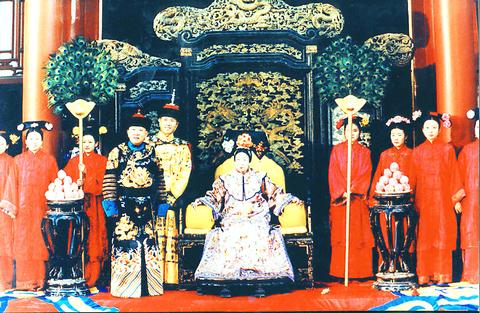
PHOTO: COURTESY OF CENTRAL MOTION PICTURE CORPORATION
It was not surprising that The Cabbie took the Jury Grand Prize, another award restricted to locally produced films, but in the light of Chang's comments in reference to his jury prize, it seemed a little bit of an anti-climax.
In a moving acceptance ceremony, the second lifetime achievement award was given to 86-year-old Cheng Chian-chou, a film promoter who help bring Taiwan film out from under the yoke of Japanese control.
The success of Crouching Tiger heralded in a new era for the awards in which outsiders had an extremely high level of representation for what is still a very Chinese oriented event.
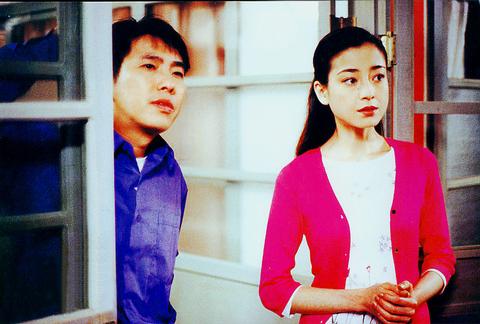
PHOTO: COURTESY OF CENTRAL MOTION PICTURE CORPORATION
Tim Squyres, a long-time Ang Lee associate, brought in the award for Best Film Editing for Crouching Tiger.
After accepting the award, he said that Lee's job on the movie was to see that the film worked in terms of Chinese culture, and his was to see that it could have a high level of understanding among Western audiences. Rob Hodgson, whose other credits include the effects for Matrix, won Best Visual Effects, and Eugene Gearty, who has been with Lee since The Ice Storm added to the haul in the technical category for best sound effects. He said that he was very impressed with the quality of the films at the Golden Horse, and with such international participation in these films, even suggested that the Golden Horse Awards be broadcast in the US.
That Christopher Doyle took Best Cinematography for In The Mood came as a surprise to no one, but the presence of a figure who has make a name for himself within the Chinese film establishment again highlighted the internationalization of the Chinese-language film sector.
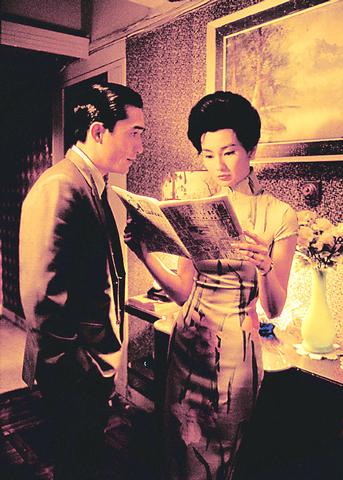
PHOTO: COURTESY OF MATA ENTERTAINMENT CO. LTD.
The nominations encompassed film works from all over the Chinese speaking world and the variety of accents on stage was a great affirmation of the diversity show in the films. Cheung Ka-nin in The Cabbie was an interesting selection for Best Supporting Actor for this quintessentially Taiwanese film. As a Cantonese and a former stunt crew member with Jackie Chan, he said his prize was largely for his accomplishment in playing a role in which he spoke in a Taiwanese dialect.
Best Picture
Crouching Tiger, Hidden Dragon (臥虎藏龍)
Best Director
To Kei-Fung (杜琪峰): The Mission (鎗火)
Best Leading Actor
Francis Ng (吳鎮宇): The Mission (鎗火)
Best Leading Actress
Cheung Man-Yuk (張曼玉): In The Mood
For Love (花樣年華)
Best Supporting Actor
Cheung Ka-Nin (太保): The Cabbie (運轉手之戀)
Best Supporting Actress
Chao Mei-Ling (趙美齡): Lament of Sand Rive
(沙河悲歌)
Best New Performer
Yiu Yuet-ming (姚月明): Little Cheung (細路祥)
Best Original Screenplay
Fruit Chan (陳果): Little Cheung (細路祥)
Best Screenplay Adaptation
Ann Hu (胡安), Huang Tan(黃丹), Tang Lu-yi (唐婁彝), Bob McAndrew, Kate Raisz: Shadow Magic(西洋鏡)
Best Cinematography
Christopher Doyle (杜可風), Li Ping-Bin(李屏賓):In The Mood For Love(花樣年華)
Best Visual Effects
Leo Lo, Rob Hodgson: Crouching Tiger, Hidden Dragon (臥虎藏龍)
Best Art Direction
Lee Fu-Hsiung (李富雄): Lament Of Sand River (沙河悲歌)
Best Make Up & Costume Design
Chang Suk-Pin (張叔平): In The Mood For Love (花樣年華)
Best Action Choregraphy
Yuen Wo-Ping (袁和平) : Crouching Tiger, Hidden Dragon(臥虎藏龍)
Best Original Film Score
Tan Dun (譚盾): Crouching Tiger, Hidden Dragon(臥虎藏龍)
Best Original Film Song
Zhang Yui-Wai (張羽偉 ): Bundled (我叫阿銘啦)
Best Film Editing
Tim Squyres (張羽偉 ): Crouching Tiger, Hidden Dragon(臥虎藏龍)
Best Sound Effects
Eugene Gearty: Crouching Tiger, Hidden Dragon(臥虎藏龍)
Grand Jury Prize
The Cabbie (運轉手之戀 )
Special Jury Prize
Chang Chi-yung (張志勇 ): Lament Of Sand River (沙河悲歌)
Special Audience Prize
Shadow Magic (西洋鏡 )
Best Short Film
Travel (旅行 )
Best Documentary
Grandma's Hairpin (銀簪子 )

Seven hundred job applications. One interview. Marco Mascaro arrived in Taiwan last year with a PhD in engineering physics and years of experience at a European research center. He thought his Gold Card would guarantee him a foothold in Taiwan’s job market. “It’s marketed as if Taiwan really needs you,” the 33-year-old Italian says. “The reality is that companies here don’t really need us.” The Employment Gold Card was designed to fix Taiwan’s labor shortage by offering foreign professionals a combined resident visa and open work permit valid for three years. But for many, like Mascaro, the welcome mat ends at the door. A
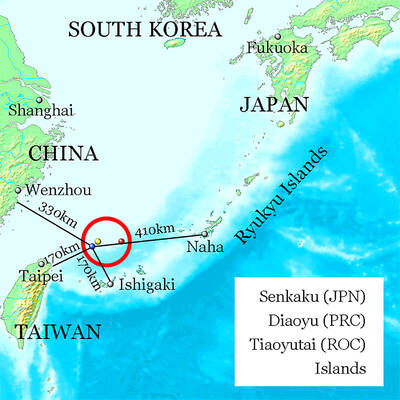
Last week gave us the droll little comedy of People’s Republic of China’s (PRC) consul general in Osaka posting a threat on X in response to Japanese Prime Minister Sanae Takaichi saying to the Diet that a Chinese attack on Taiwan may be an “existential threat” to Japan. That would allow Japanese Self Defence Forces to respond militarily. The PRC representative then said that if a “filthy neck sticks itself in uninvited, we will cut it off without a moment’s hesitation. Are you prepared for that?” This was widely, and probably deliberately, construed as a threat to behead Takaichi, though it

If China attacks, will Taiwanese be willing to fight? Analysts of certain types obsess over questions like this, especially military analysts and those with an ax to grind as to whether Taiwan is worth defending, or should be cut loose to appease Beijing. Fellow columnist Michael Turton in “Notes from Central Taiwan: Willing to fight for the homeland” (Nov. 6, page 12) provides a superb analysis of this topic, how it is used and manipulated to political ends and what the underlying data shows. The problem is that most analysis is centered around polling data, which as Turton observes, “many of these
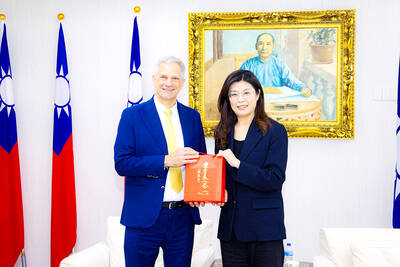
Since Cheng Li-wun (鄭麗文) was elected Chinese Nationalist Party (KMT) chair on Oct. 18, she has become a polarizing figure. Her supporters see her as a firebrand critic of the ruling Democratic Progressive Party (DPP), while others, including some in her own party, have charged that she is Chinese President Xi Jinping’s (習近平) preferred candidate and that her election was possibly supported by the Chinese Communist Party’s (CPP) unit for political warfare and international influence, the “united front.” Indeed, Xi quickly congratulated Cheng upon her election. The 55-year-old former lawmaker and ex-talk show host, who was sworn in on Nov.